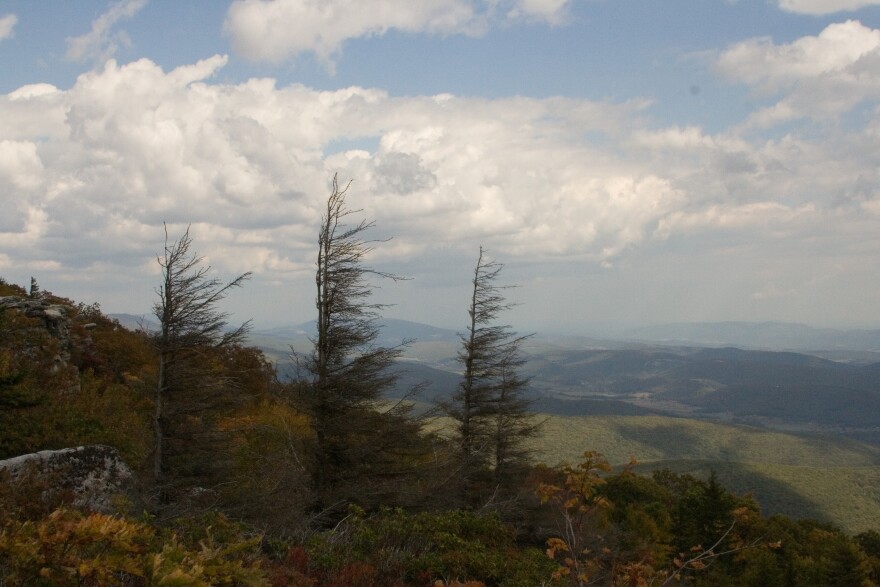W.Va. Biscuit Voted ‘South’s Best’
Tudor’s "Mountaineer” biscuit was named “The South’s Best Biscuit” in an online poll contest held by Garden & Gun, a southern lifestyle magazine.
Continue Reading Take Me to More News
“Montani Semper Liberi — Mountaineers Are Always Free” is West Virginia’s state motto, but it is more than that. It is a belief system that is not just true about the Mountain State. It rings true throughout Appalachia and even mountains on other continents.
On this episode of Inside Appalachia, we’re taking another listen to a show that we aired last summer. It delves into how the natural environment has influenced our lives.

West Virginia Public Broadcasting recently launched a reporting series called “Wild, Wondering West Virginia”. Listeners submit questions, an online audience votes for the question they’d most like to know about and then reporters seek out the answer.
The latest question came from Brian Joseph, of Wheeling, West Virginia. He wanted to know about the Appalachian Mountains and their sister mountains, and how they shape who we are.
While at one time, researchers considered the Appalachian Mountains among the oldest on Earth, West Virginia Public Broadcasting’s Glynis Board found they might also be the youngest.
Discovering Appalachian Heritage

The memoir “Appalachia North”, by Matthew Ferrence is about the realization he had, as an adult, that he too is Appalachian, even though growing up in Pennsylvania, he never heard people talk about this identity. Eric Douglas spoke with Ferrence about his book.
Beauty, Pollinators and Money
Across the country, highways and interstates cut through much of our natural landscape. More than 160,000 miles of pavement, most often bordered by grass that has to be mowed.
In Ohio, the state highway department started planting wildflowers that are good for monarch butterflies. But as we’ll hear in this episode, this approach isn’t only beneficial for the butterflies.
Kentucky Water Problems
In some places here in the Appalachians, the combination of steep mountains, low valleys, and heavy rainfall creates flash flooding that can ravage communities. Flood waters can push water and sewage systems past their limits, causing massive infrastructure damage.
While most Kentuckians have access to clean water — the infrastructure that makes that possible is aging and in dire need of repair. And as infrastructure continues to age, and weather patterns continue to change, the problems may only get worse. These water problems, both with drinking water and wastewater, are expected to plague the state and the nation for years to come.
Building roads, maintaining bridges, and establishing good “city” water systems are difficult and expensive. The very nature of the mountains we love makes it difficult to maintain this infrastructure. Hillsides slip, water seeps in and then freezes causing the ground to rise and buckle. Water lines don’t break when it is convenient or easy to fix, either. They break when it is below freezing outside, or heavy rains cause the ground to shift.
Living without access to consistent clean, tap water can be anything from an inconvenience to expensive to a health hazard.
And if there’s no water operator around, communities will eventually suffer. Right now, there aren’t enough trained water operators in parts of Appalachia.
To find schedules of upcoming training courses, we recommend you check directly with:
West Virginia Rural Water Association 1-800-339-4513
West Virginia Environmental Training Center 304-372-7878
Kentucky’s Division of Compliance Assistance 502-564-0323
Virginia Board for Waterworks and Wastewater Works Operators and Onsite Sewage System Professionals
Tennessee Department of Environment and Conservation 888-891-TDEC (8332)
Pennsylvania Department of Environmental Protection 717-783-2300
Loading…
Cleaning Up Trash

Trash is a growing global problem. Humans are producing waste at a rapid pace and most of our trash ends up in landfills. In the United States, we produce more than 200 million tons of trash every single year. A company in the eastern Panhandle of West Virginia is turning that trash into fuel, as Liz McCormick reports.
We had help producing Inside Appalachia this week from WKYU in Bowling Green, Kentucky, WOSU in Columbus Ohio, and the West Virginia Public Broadcasting Education Department.
Music in this episode was provided by Dinosaur Burps, Marisa Anderson, Michael Howard, and Ben Townsend.
Roxy Todd is our producer. Eric Douglas is our associate producer. Our executive producer is Jesse Wright. He also edited our show this week. Our audio mixer is Patrick Stephens.
